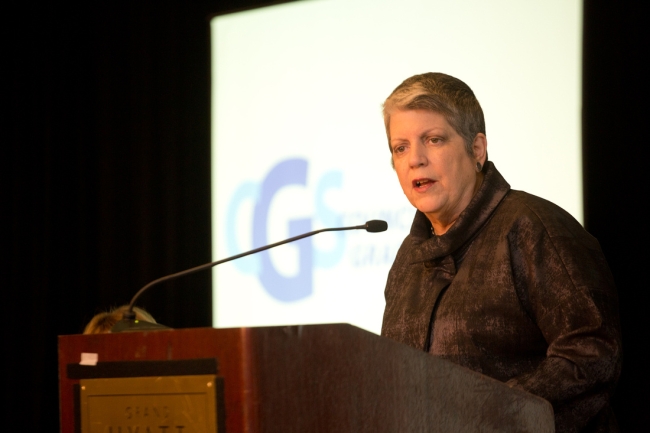You have /5 articles left.
Sign up for a free account or log in.

Janet Napolitano addresses graduate school deans
Council of Graduate Schools
WASHINGTON – Janet Napolitano has held many titles: governor of Arizona, secretary of homeland security, and now president of the massive University of California system. But there’s one role she just can’t step out of – that of a lawyer. She used what she called her litigation skills here Thursday during the Council of Graduate Schools' annual meeting, to “make the case” for graduate school education. More administrators need to do the same, she said, imploring those in attendance to move beyond the comfort of the “echo chamber” and the “coalition of the willing" to a wider audience of policy makers and the general public.
“We all need to be on the Hill, because federal funding has not been what it should be,” Napolitano said, after only a handful of the hundreds listening to her plenary address raised their hands when she asked if they planned on visiting legislators at the Capitol during their trip here. She said administrators, along with students, must find ways to communicate that their campuses are “huge economic hubs” that not only make money but also contribute to an informed citizenry. Crucial to this effort, though, she cautioned, is foregoing flowery dissertation titles and jargon for a clear, concise message about the important research and learning taking place on their campuses. “Why lead with your chin?” she said.
Napolitano added: “We all need to be on the Hill and say that for us to thrive in this century, we need to be competitive – and the only way we will compete with other countries is by having the brainpower to do it. That means graduate-level education.”
She compared making the case for graduate education to developing the “issue presented” in law, or laying the framework for a legal question. Saying she’s had her own “tussle” with California Governor Jerry Brown over state funding for the university system, Napolitano broke down the pro-graduate education argument into three parts: economics, data and evidence. First, she said, by 2020, when “Hillary [Clinton] is nearing the end of her first term,” 2.6 million new jobs will require advanced degrees. In California alone, 640 startups are based on inventions created within the University of California, she added, saying that the state is projected to need tens of thousands of new professors as the baby boomer generation retires.
When numbers aren’t enough, Napolitano said, administrators need to ask rhetorical questions, such as, “If graduate education is ‘irrelevant,’ why are countries like China doing all they can to build graduate education programs?” Why are private labs increasingly moving into the academy, she asked, and why do “hubs of innovation,” such as Silicon Valley, springing up in the shadows of major research universities?
If all else fails, Napolitano said, administrators can counter the negative anecdotes about graduate education – the barista with a Ph.D., students buried in debt – with their own, more positive anecdotes, which are “firmly rooted in reality.”
She spoke about Mary-Claire King, a geneticist at the University of Washington whose work as a graduate student and faculty member within the California system eventually led to her discovery of a breast and ovarian cancer-related gene. Napolitano said “persistence was part of the culture” at California, and that King learned to be “uncomfortable with uncertainty for years.”
Napolitano also mentioned Roy Fielding, who was a primary architect of hypertext transfer protocol, or “http,” on which much of the web is based. The president said Fielding’s time as a graduate student at the Irvine campus’s software research group gave him the time, space and confidence he needed to achieve that breakthrough – something profit-driven businesses typically can’t offer.
For those who doubt the value of graduate education in the humanities and social sciences, in particular, Napolitano discussed Ian Breckenridge-Jackson, a current Ph.D. student in sociology at the Riverside campus who founded a living museum in New Orleans’s Lower Ninth Ward. The development is helping to preserve the culture of the historic neighborhood, which has faced existential threat in the post-Hurricane Katrina years.
Because even public colleges and universities increasingly have to look beyond the government and students for funding, Napolitano also advised deans to make the case to donors. She advised inviting donors to campuses and offering hands-on demonstrations of the value of higher education, saying a laparoscopic surgery experiment she was once allowed to participate in at the Irvine campus left a big impression.
“I still have the [foam rubber gallbladder] in my office,” she said, to some laughter. “That’s the kind of thing that sticks with people. … People want something that will outlast them."
Comparing making the case for graduate education to a political campaign with no clear end date but guaranteed individual and collective “victories,” Napolitano again asked: “Who better in this room to do it?”
During a lengthy discussion period, John Stevenson, dean of the Graduate School at the University of Colorado at Boulder, said he “couldn’t agree more” that both data and anecdotes supported the case for graduate education. But he said he wondered if such utilitarian arguments were “strangling” or too narrowly defining the “rest of the battle” – that is, framing graduate education as a public good.
Napolitano didn’t answer the question directly, but said the U.S. needs well-educated citizens to “thrive,” and reiterated that the country would “not be innovating” without higher education.
Mary Ellen Lane, an associate dean of the Graduate School of Biomedical Sciences at the University of Massachusetts at Worcester, said that with all the public scrutiny of graduate education, it was hard to have honest conversations about reform, without risking losing further funding.
“When you have these conversations too loudly, the Tea Party wins,” she said.
Napolitano agreed that graduate education needs some reform, saying that it’s “not good” when it takes nine years to get a humanities Ph.D. She also said the increasing employment of postdoctoral candidates for positions graduate students or faculty members traditionally have held poses many problems, and that the system is in some ways perversely incentivized by federal grant processes. Napolitano didn't elaborate, but some academics have argued that colleges and universities are over-reliant on grants and the relatively inexpensive postdoctoral fellow labor they finance.
She again encouraged deans to engage in honest conversations with those who can make a difference, regardless of the political risk.
“Why are we coming to D.C. and talking to each other, instead of talking to others who need to hear us in that endeavor?” Napolitano asked.
Charles Taber, vice provost for graduate and professional education and dean of the Graduate School at the State University of New York Stony Brook, said he “generally agreed” with Napolitano’s assertion that graduate deans need to become advocates to legislators and the public.
But he said the most “difficult challenge will be turning the national conversation from a focus on the cost of higher education to a more nuanced understanding of the benefits to state, nation, and world of higher ed and graduate education in particular.” Immediate economic factors are “very important,” he added, “but only part of the story.”





